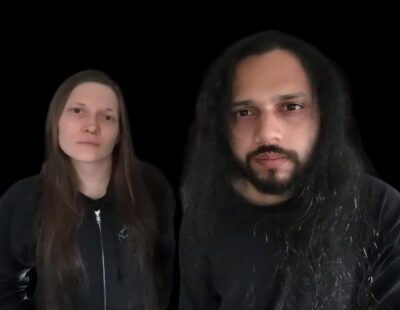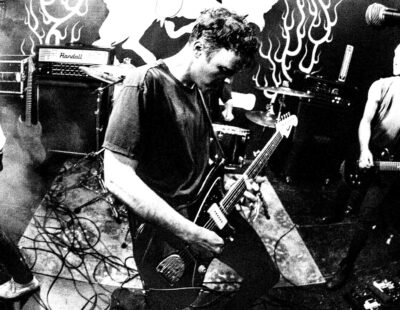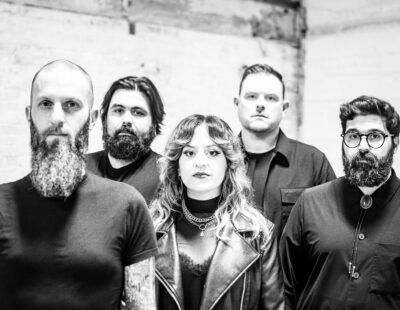We don’t talk about love a whole lot here at Decibel, and we don’t cover a lot of bands that take influence from Duran Duran. But if you’re tuned into the singularly unique world of Sacramento’s Deftones, you’ll understand that songs of love will be surrealistic, open to interpretation, and tempered with an undercurrent of ridicule… and you’ll know the Duran Duran influence is just a tiny part of what makes Deftones tick.
In talking with drummer Abe Cunningham recently, it was clear the band is as psyched with extremists such as Dillinger Escape Plan and Cannibal Corpse as they are the Cure and Jane’s Addiction. The latest Deftones album, Koi No Yokan, “runs the gamut of what we’re about,” according to Abe. All inspirations present and accounted for. Koi No Yokan not only carries interesting meaning in the title, but it drags a pile of mammoth heaviness and chilled beauty into the room and doesn’t leave.
Abe was familiar with what we do here at Decibel, and lots of us are familiar with what they do, so we’re all friendly-like. So it probably wasn’t the most tactful thing to open up the conversation by telling Abe that Koi No Yokan seems to share a lot of similarities with 2006’s Saturday Night Wrist. That didn’t sit well with Abe: “Saturday Night Wrist was just a fucked up record for us. That was a horrendous time. We were out of our minds. A terrible time, dude. And that contributed to how the record sounded. I think that album is just another side of our life, just like the new one. But those are very different sides of life.”
Oopsie. Abe was definitely not on board with the comparison, but, super nice guy that he is, he took it in stride when I elaborated that the comparison was made because Koi No Yokan leans on the chilled, melodic, shoegaze-y side of the band, as did Wrist. Even the cover art has a similar feel to SNW. “I can dig it,” he says. And when I opine that the new album carries a more joyous vibe than anything they’ve done, he’s down. “I like that. Joyous is good. Joyous!”
“Joy” would seem to be a theme of the record, as there are some seriously ecstatic, emotionally throttling moments in opener “Swerve City,” the dreamy shoegaze haze of “Entombed” and album centerpiece and all-time-great Deftones track “Tempest.” Lots of good vibes throughout, including the meaning behind the album title. Japanese phrase Koi No Yokan translates to “love’s premonition,” or “the sense a person gets upon meeting someone that the two of them will inevitably fall in love.” Profound, but the choice of title wasn’t exactly destiny, says Abe: “It was one of those things where we were running up against deadlines. We all threw some names into the hat, and it was one of those things that popped out. It’s actually a pretty cool title; it has an interesting meaning. Not to sound lovey-dovey–it’s still a heavy record–but it was a cool thing to call the album.”
Deftones got their start way back in 1988, the same year Dimension Hatröss, South of Heaven and Leave Scars were released, if you need that framed into some kind of perspective. (i.e., this band is not “nu metal” and never were.) Guitarist Stephen Carpenter, 17 years old at the time, was confined to a wheelchair for a while as the result of a car accident. With not much to do but listen to metal and play guitar, he cut his teeth on the instrument learning Metallica, Anthrax and S.O.D. tunes. Seven years later, they’re rubbing shoulders with Madonna and her Maverick label. There was a time when it was easy, if totally lazy, to lump them into the nu metal movement, but they quickly outgrew that with 2000 watershed album White Pony. They have tread some arty, textured, alt-metal avenues since, while remaining heavy as all fucking fuck when necessary (need proof? Check out the insanely feral “Elite,” grooved-out-and-doomed “You’ve Seen the Butcher” or the fat tones of the new album’s “Poltergeist”). Deftones played it smart and ensured their longevity by not falling into any one movement.
“It became such a huge slur of a term, ‘nu metal,’” Abe says. “Kinda like the ‘grunge’ thing. We started in 1988. Metal was huge and popular at that time, even being played on MTV. That’s our upbringing, but we decided to make an extreme left turn and do our own thing. We knew we had to if we wanted to be around for the long term. We just went somewhere else, musically. I mean, Stephen’s guitar, from the get-go, with that tone, we were a metal-based band, but there were other things going into it, too, and that was the way it evolved. We never considered ourselves anything, genre-wise, and that was very much by design. We always wanted to expand. Some of these other bands, they can’t. They can’t, or they won’t. And we were able to. Not to be negative, because if you can make a living playing music doing what you’re doing, there’s nothing wrong with that at all, man. But we needed to go the other way.”
And things are going amazingly well in Deftones-world right now. The band had just gotten back from South America when Abe called for this chat, and Koi No Yokan had just been released. The percussion tank behind the band was looking forward to trying out more new material in the live setting, now that fans will actually be familiar with the stuff. “The album’s only been out a few days, so we were playing just a few new songs up until, well, maybe tonight, where we’re going to put together a set list with a few more new ones. We have been playing ‘Leathers,’ ‘Poltergeist,’ ‘Rosemary’ and ‘Tempest.’ Now that the record’s out, we can actually throw in more stuff; there’ll be another new one tonight. See what works, and also what makes the people happy. And there’s a lot of stuff to play, too, having a lot of albums out now, so we’re trying to make it all work.
My connection with Abe was a bit garbled at times (cell technology isn’t perfect, pretty sure we all realize that by now); some of the conversation was unintelligible, but in between the muffle and crackle, Abe talked a good bit about the band’s brotherhood and the overwhelmingly positive vibe in the band right now. Abe, Stephen and vocalist Chino Moreno went to school together, and they’ve seen the world multiple times over while making a nice living from their music. Despite that, Abe admits, “about every time we do a record, Stephen and I usually have the biggest blowout while we’re writing. Not really me, but he does, and I just sit back and let him have his words and then at the end we talk about it and figure it all out. It can get crazy when we’re writing. Not for me, but for him.” He adds, with a laugh: “Stephen needs to lighten up.”
Looking at the band’s journey so far, comparing how things felt when they formed back in the late ’80s to how they feel now, Abe is philosophical: “In some ways it’s exactly the same,” he muses. “These dudes are my brothers, my best friends. But we’re still trying to get our shit right. Do what feels right. Not as a business, but from a creative standpoint. And keeping balance, that’s important. We went through many years of being wild and having a blast, and we’ve suffered some, too, and we’re just trying to be healthy and do it right. If anything, we just respect each other, our friendships and our band, and trying to do things right, while all the while having a fucking blast.”
The positivity happening in the band right now is underscored when Abe is asked about the still-shelved Eros album. In 2008, original bassist Chi Cheng was thrown into a minimally-conscious state as the result of a car accident. Everything less important, including the album they were recording at the time, went on the back burner. With Chi making slow progress over the years, the band have kept cool regarding the album’s fate, but Abe reveals: “It’s mostly done. We have a couple things to finish, but it’s in a vacuum right now. What happened with Chi fucked things up there for a while. We didn’t know what we were gonna do with the album. It was one of those things where we were trying to figure it out, every single day. And Chi’s condition was obviously most important. So we just kind of stopped at one point. We weren’t even sure if we wanted to be a band or not. We took a couple months off because we didn’t know what to do, and Sergio [Vega, ex-Quicksand] came in because we had an obligation for a show we had to play. Sergio was a friend and a fan, and we started jamming, and we figured if we could feel good about what we were doing, we’d do it. Then all of a sudden we were together making a record [Diamond Eyes], and it turned out so great we just didn’t want to look back. So Eros is part of the past. I’d like to have it out at some point, but right now there’s a real positive vibe in the band and we’re trying to keep it that way.”






